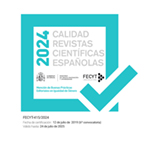Analysing digital social reality: towards a methodology for digital social research
Abstract
Digital environments have become ideal spaces for researching forms of sociability, change and social action. However, the Internet is not only a research context, but also an object of study and a medium of research. In this editorial we set out some key questions for thinking about the digitzation of research methodology and discuss how digital technologies are shaping key sociological issues. Digital technologies offer the possibility of developing novel research techniques but also force us to rethink tools, practices and ways of disseminating research. Until now, female researchers have been torn between digital skepticism, weighed down by our lack of computer skills, and methodological enthusiasm, which embraces the digital age without criticism or qualms. In this text, we invite you to consider carefully the ontological, epistemological and methodological implications of all these changes in our research work.
Downloads
Publication Facts
Reviewer profiles N/A
Author statements
- Academic society
- N/A
- Publisher
- Grupo de Investigación Cultura Digital y Movimientos Sociales. Cibersomosaguas
Article download
License
In order to support the global exchange of knowledge, the journal Teknokultura is allowing unrestricted access to its content as from its publication in this electronic edition, and as such it is an open-access journal. The originals published in this journal are the property of the Complutense University of Madrid and any reproduction thereof in full or in part must cite the source. All content is distributed under a Creative Commons Attribution 4.0 use and distribution licence (CC BY 4.0). This circumstance must be expressly stated in these terms where necessary. You can view the summary and the complete legal text of the licence.
















